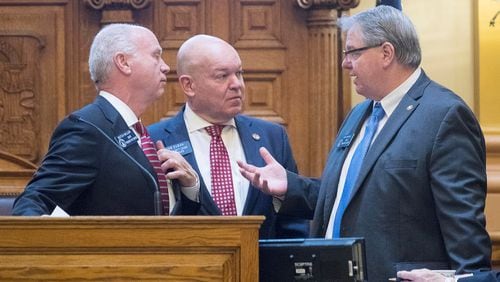As one of the Georgia Senate’s first orders of business Monday, senators passed rules making it less likely that lawmakers will investigate allegations of sexual harassment against their colleagues in the future.
In a resolution passed Monday, the first day of the 2019 legislative session, lawmakers voted to approve rules that require people who believes they’ve been harassed by a senator or Senate staffer to bring their allegations forward within two years of the alleged incident. Previously there had been no time limit.
The time limit would apply to all complaints about the conduct of senators, not just sexual harassment cases. The rule also says anyone who files a complaint and makes it public could see it automatically dismissed and face sanctions, including possibly fines.
The change would have ruled out last year's complaint against a former Senate leader, who was accused of sexually harassing a lobbyist in 2011. A panel of Senate leaders meeting in secret ended up dismissing the complaint, but the case hurt the political chances of then-state Sen. David Shafer, who lost the Republican primary runoff for lieutenant governor.
Senate Majority Leader Mike Dugan told lawmakers Monday that the intent of the rule change was to increase the level of scrutiny that goes into investigating claims of harassment or other poor conduct. He said complaints filed with the federal Equal Employment Opportunity Commission must be filed within six months of the alleged act occurring.
“We had to draw a line somewhere,” said Dugan, a Republican from Carrollton. “And we thought a year-and-a-half longer than what an EEOC complaint would be was a reasonable amount of time.”
But state Sen. Nan Orrock, D-Atlanta, called it concerning that lawmakers voted to narrow the time for people to report harassment. All the chamber's Democrats opposed the resolution.
“This change is very troubling when we had a leader in the Senate who had charges brought against him just last year,” Orrock said.
The changes also increase the burden of proof for making an allegation public, lifting it from the charge having “reasonable grounds” to requiring “substantial credible evidence exists.”
Of the 33 men in the majority Republican caucus, 32 voted for the new rules, as did state Sen. Kay Kirkpatrick, R-Marietta. Senate President Pro Tem Butch Miller, R-Gainesville, presided over the chamber and didn't vote.
By contrast, on his first day in office, new Gov. Brian Kemp late Monday issued an executive order overhauling sexual harassment training and making Georgia’s inspector general the repository for state agency complaints, ending the current siloed system which allowed each department to handle allegations in its own way.
Late last session, a veteran lobbyist filed a complaint against Shafer, who was considered the front-runner in the race for lieutenant governor.
The lobbyist said Shafer retaliated against her and harassed her after helping her get a bill passed in 2011, and the case was the talk of the final few days of the 2018 session.
The Senate's Ethics Committee hired an Atlanta employment lawyer to investigate the allegations. The group's deliberations were held in secret, and the case against Shafer was dismissed after the lawyer investigating the case "failed to find credible evidence of sexual harassment or a violation of the Senate Rules."
Shafer urged the Senate committee to make the investigative report public. But the Georgia General Assembly long ago exempted itself from the Georgia Open Records Act, so the file remained secret. The Atlanta Journal-Constitution, however, was able to obtain a copy of the complaint.
Shafer was the choice of many Republican senators, Capitol lobbyists, special interests and institutional donors to win the lieutenant governor's race. He narrowly missed winning the GOP primary outright, but then he lost the Republican runoff to former state Rep. Geoff Duncan after an "independent group" spent $3 million on mailings and ads that, among other things, raised the sexual harassment complaint as an issue.
Duncan went on to win the general election in November.
Under the new rules, the Senate ethics panel wouldn’t consider complaints if they are filed after a lawmaker qualifies to run for re-election or another office and before an election. The committee would wait until the results of the election are certified. The state ethics commission also doesn’t adjudicate complaints right before an election.
Democrats also took issue with changes in the way people are required to behave in the chamber or “Senate environs.” Democrats said the language was too vague.
The change prohibits any noise or signs in the “gallery, lobbies or hallways in the immediate environs of the Senate during any legislative proceeding.”
Orrock also questioned the timing of the change.
"Last November we saw a black female member of the Senate taken out in handcuffs," she said, referring to the arrest of state Sen. Nikema Williams, D-Atlanta, during a protest in the Capitol. "It's outrageous and it has a chilling effect on our democratic rights."
Why it matters
In the midst of the #MeToo debate, a veteran lobbyist filed a complaint in March saying a state senator harassed her after helping her pass a bill in 2011. The Senate Ethics Committee dismissed the case after investigating, and the Senate Republican majority on Monday passed new rules limiting when someone can file a complaint and threatening sanctions, including fines, if the complaint is disclosed to the public.









